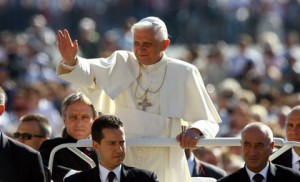 Pope Benedict XVI’s three day visit in Lebanon earlier this month carried a meaningful message of hope in troubled times. Despite international tensions, the Lebanese people united to welcome him, demonstrating their desire for successful coexistence.
Pope Benedict XVI’s three day visit in Lebanon earlier this month carried a meaningful message of hope in troubled times. Despite international tensions, the Lebanese people united to welcome him, demonstrating their desire for successful coexistence.
The event coincided with new international tensions due to the The Innocence of Muslims, a low-budget YouTube video by an individual in the United States, who according to news reports, has engaged in fraud in the past. The video sparked many vehement anti-American protests around the world.
With negative stories like these garnering so much attention, it is especially important to pay attention to the positive ones that might be overlooked.
Despite the tensions, all Lebanese religious communities – not only Christian, but also Shia, Sunni and Druze – as well as some political party representatives, welcomed the Pope, reminding the world that this country was built on the idea of diversity and celebrating all faiths.
The neighbourhood near the Beirut airport, where Pope Benedict landed, has a majority Shia population, and Shia women lined up to greet him as he arrived in the country. The next day, it seemed that the image capturing that moment was everywhere in the news. The image is striking in many ways, but it is also a natural aspect of day-to-day coexistence in Lebanon.
Many Lebanese people have often emphasised that the coexistence of religions is the country’s only way forward – so often that this message may seem like an overused cliché. However, it is also true, which Lebanese citizens know. The reality of coexistence was evident in the papal visit. The Pope repeatedly expressed hope for peace in Syria and the Middle East in general, urging Christians and Muslims alike to strive for harmony in coexistence.
Pope Benedict saluted the presence of Muslims in the audience both at a youth gathering on 15 September, as well as at an open-air Sunday Mass the next day that was organisers said was attended by around 350,000 people. Many Lebanese people remember the words of Pope Benedict’s predecessor, John Paul II, during his 1997 visit to Beirut: “Lebanon is more than a country, it’s a message” – referring to the fact that the country houses so many different religious communities which coexist side by side.
Today more than ever, the message that is Lebanon must be heard.
This is all the more urgent considering the news about some Lebanese protestors setting fire to an American chain restaurant in the northern Lebanese city of Tripoli 14 September to protest the The Innocence of Muslims video. The confusion and misinformation surrounding the video provoked disproportionate reactions throughout the Muslim world against innocent people who are not responsible for a defamatory YouTube video. Yet even with hurdles like these, there is hope for Lebanon.
Lebanon may be caught up in regional and international power struggles, but there are reasons to be optimistic about its future. Most Lebanese know that their country can only succeed if they recognise, respect and celebrate each other’s faith.
More than a message of hope and peace, Pope Benedict’s visit to the Middle East was a reality check and an important reminder that this is first and foremost the land that brings different religions together. It is the home of Christians and Muslims alike. When an obscure video can cause such a mess, these reminders matter.
What is needed now is for ordinary Lebanese to continue to foster coexistence. As one person observed while watching the Pope on television in a Beirut café: “It’s a good thing that we all welcomed him, but it’s up to us to make it count in the long term.”
By: Nada Akl
* Nada Akl is a freelance journalist based in Lebanon. This article was written for the Common Ground News Service (CGNews).
Global Arab Network

Leave a Reply
You must be logged in to post a comment.